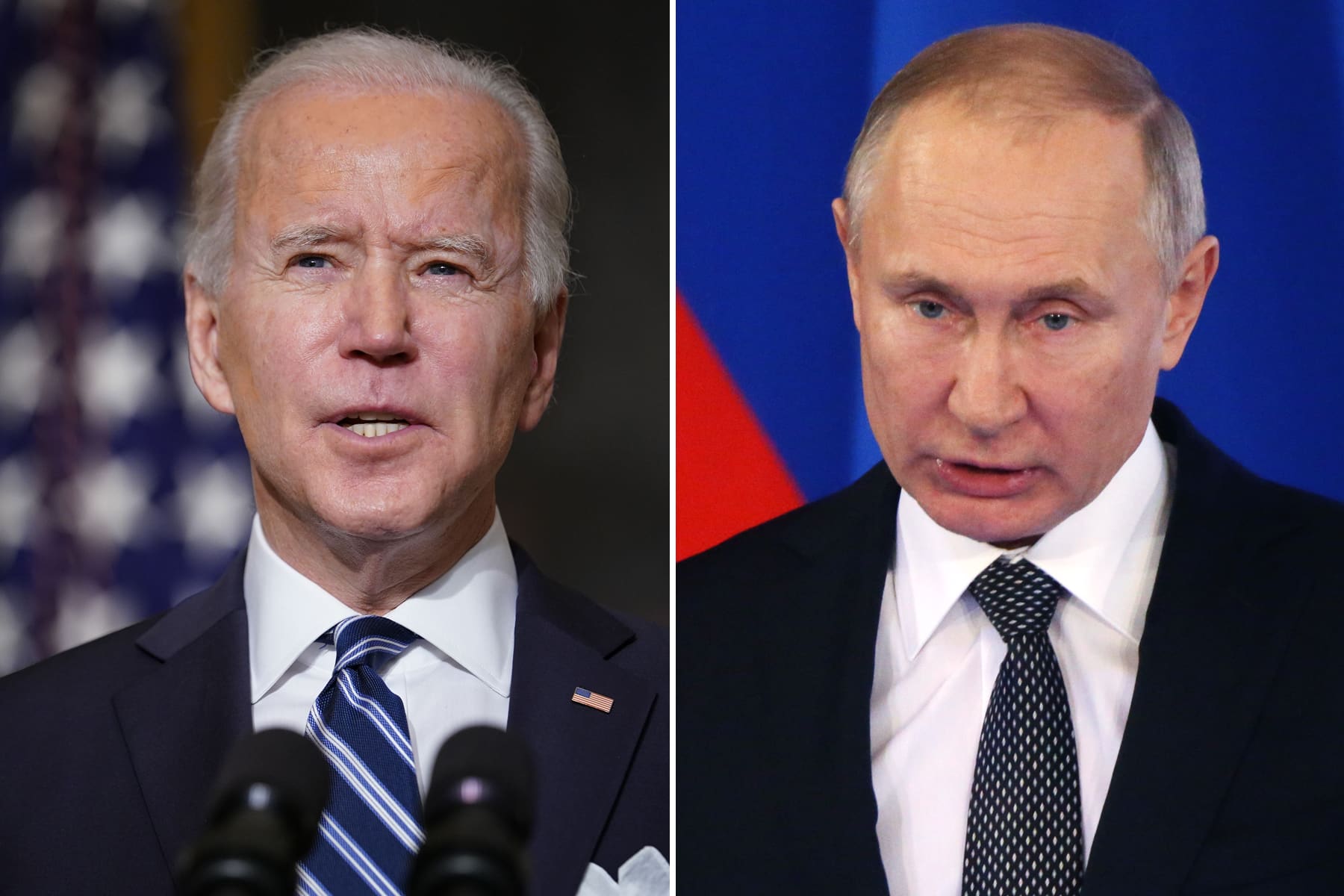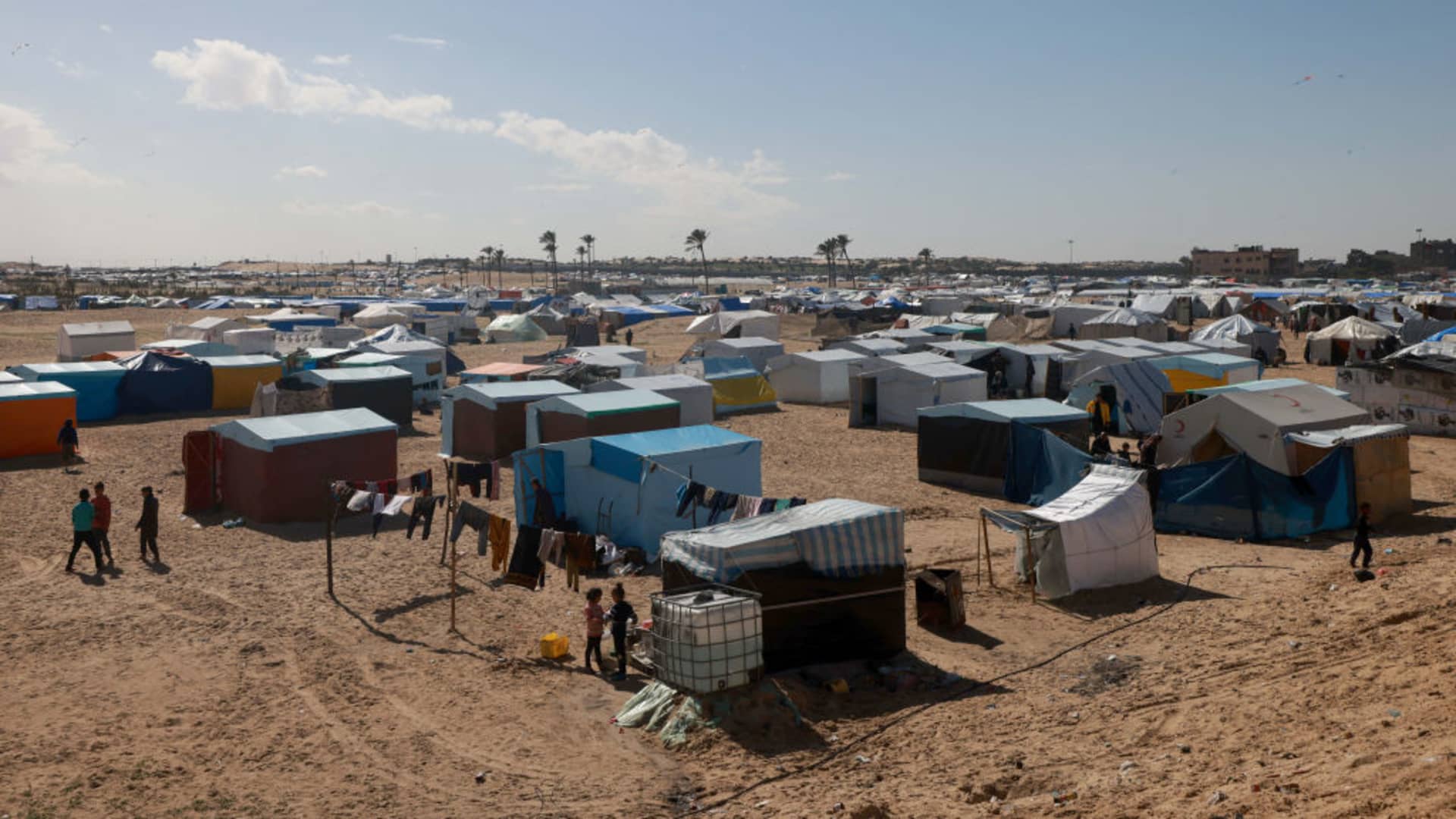President Joe Biden (L) and President Vladimir Putin.
Getty Images
The Biden administration imposed a raft of new sanctions against Moscow on Thursday over alleged interference in the 2020 election, a colossal cyberattack against U.S. government and corporation networks, illegal annexation and occupation of Crimea, and human rights abuses.
“Today, the U.S. Department of the Treasury’s Office of Foreign Assets Control (OFAC) took sweeping action against 16 entities and 16 individuals who attempted to influence the 2020 U.S. presidential election at the direction of the leadership of the Russian Government,” the Treasury said in a statement.
It also announced sanctions on five individuals and three entities linked to Russia’s occupation of Ukraine’s Crimea region and human rights abuses.
In addition to the broad sanctions issued by Treasury, the State Department announced it will expel 10 officials from Russia’s diplomatic mission in the United States.
The sanctions come following President Joe Biden’s phone call this week with Russian leader Vladimir Putin, and as Russian force amass near the Ukraine border.
Washington formally accused Russia’s Foreign Intelligence Service, or SVR — its top spy agency — of being behind the SolarWinds cyberattack publicized late last year, described by cybersecurity experts as one of the largest and most sophisticated hacking operations in history.
“The U.S. Intelligence Community has high confidence in its assessment of attribution,” the Treasury release said. The attack saw hackers gain access to the software used by thousands of government bureaus and companies.
The penalties are also in response to a March report by the U.S. Director of National Intelligence that concluded Russia’s President Vladimir Putin authorized attempts to interfere in the 2020 election in former President Donald Trump’s favor.
The Russian government denies all of the allegations.
Biden also signed an executive order Thursday that allows Washington to sanction any sector of Moscow’s economy, significantly broadening the scope of sanctions authorities.
Under this new authorization, U.S. financial institutions are prohibited from conducting transactions in the primary market for new ruble or non-ruble denominated bonds issued after June 14.
“The President signed this sweeping new authority to confront Russia’s continued and growing malign behavior,” Treasury Secretary Janet Yellen said in a statement applauding the measure.
“Treasury is leveraging this new authority to impose costs on the Russian government for its unacceptable conduct, including by limiting Russia’s ability to finance its activities and by targeting Russia’s malicious and disruptive cyber capabilities,” she added.
One of those named in the new actions is Konstantin Kilimnik, a Russian agent with ties to former Trump campaign boss Paul Manafort, who has been charged in special counsel Robert Mueller‘s investigation of Russian meddling in the 2016 election.
The FBI is offering $250,000 for information leading to Kilimnik’s arrest, who is believed to be in Russia. Moscow prohibits the extradition of a Russian national to any country.
Worsening U.S.-Russia relations
Taking a tougher stance on Russia was one of Biden’s foreign policy campaign pledges. The measures announced Thursday join a series of past moves: the Obama administration’s debt financing restrictions for major Russian companies like Rosneft, and the Trump administration’s ban on U.S. entities buying Russia’s foreign currency government loans.
“Today’s U.S. sanctions continue the general trend of worsening relations witnessed ever since the annexation of Crimea,” Maximilian Hess, head of political risk at London-based law firm Hawthorn Advisors, told CNBC.
“The key portion” of these sanctions, he said, “is the barring of U.S. entities from the primary market for ruble-denominated debts by the Russian government.”
However, Hess noted, this “will not have a major impact, particularly given Russia’s manageable debt load.”
Ukrainian servicemen work on their tank close to the front line with Russian-backed separatists near Lysychansk, Lugansk region on April 7, 2021.
Photo by STR/AFP via Getty Images
For Timothy Ash, senior emerging markets strategist at Bluebay Asset Management, the measures are far from harsh.
“It’s like guys, come on, you need to do better than this,” Ash wrote in a note following the announcement.
“Sovereign primary still allows U.S. entities to hold this debt. So U.S. institutions cannot buy Russian sovereign debt in primary issuance, but can get their Russian bank friends to buy it for them in primary, give them a fee, and then buy it in the secondary.”
The rouble pared some of its day’s losses against the greenback shortly after the sanctions news, trading at 76.3025 to the dollar at 4 p.m. local time compared to 77.0718 just before the sanctions details were announced.
Russian troop buildup on Ukraine border
The Biden-Putin call Tuesday, at least the second between the two men since Biden took office in January, comes as the United States and other Western countries grow weary of Russia’s growing military buildup along its border with Ukraine, where it has amassed tens of thousands of troops and tanks.
“We’re now seeing the largest concentration of Russian forces on Ukraine’s borders since 2014,” Secretary of State Antony Blinken said Tuesday after visiting NATO’s headquarters in Brussels. “That is a deep concern not only to Ukraine, but to the United States.”
Regional experts say this move could be an attempt to test Biden’s mettle and intimidate Ukraine; the more pessimistic outlook suggests its aim is to goad Ukraine into renewed conflict.
Biden in the phone call with Putin “emphasized the United States’ unwavering commitment to Ukraine’s sovereignty and territorial integrity,” according to a White House readout.
Biden proposed holding a summit somewhere outside the U.S. and Russia “to discuss the full range of issues facing” the countries.
The Kremlin later on Tuesday said in a statement that Biden had “suggested considering the possibility of holding a personal summit meeting in the foreseeable future.”





